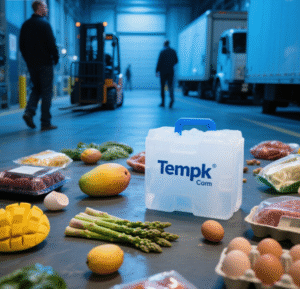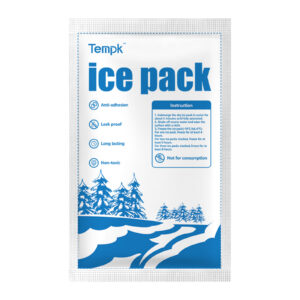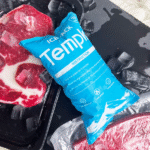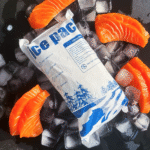Eisbeutelfirmen: Innovationen in der Kühlkette vorantreiben
In der heutigen schnelllebigen Welt, Es geht nicht nur darum, sie in Eis zu verderben, sondern es geht um Präzision, sondern um Präzision, Nachhaltigkeit, und Smart Tech. ICE -Pack -Unternehmen sind nicht mehr nur Lieferanten von gefrorenen Beuteln; Sie sind wichtige Akteure in globalen Lieferketten, Das Gewährleiden des Farmfrischen-Gemüses bis hin zu lebensrettenden Impfstoffen kommt in Top-Zustand ein. So definieren führende Firmen neu.

1. Jenseits von "nur Eis": Engineering Cold für spezifische Anforderungen
Vorbei sind die Zeiten der Einheitsgelpackungen. Moderne Hersteller von Eisbeuteln fertigen mittlerweile selbst spezialisiert Lösungen. Verwenden Sie fortschrittliche Phasenveränderungsmaterialien (PCMs), Sie entwerfen Packungen, die bei exakten Temperaturen stetig sind - wie 2–8 ° C für Impfstoffe oder –18 ° C für gefrorene Meeresfrüchte. Diese „intelligenten“ Gele dauern länger, Überschüssige Feuchtigkeit reduzieren, Und lassen Sie die Versender abkühlen auf ihre Route-nicht mehr über das Gefrierpunkt, um auf Nummer sicher zu gehen.
2. Umweltfreundliche Materialien: Ein Muss für den heutigen Markt
Mit Nachhaltigkeit im Mittelpunkt, Hersteller von Eisbeuteln verzichten auf altmodische Kunststoffe. Viele verwenden mittlerweile recycelbares HDPE, kompostierbare Stärkefolien, oder sogar Gele auf Algenbasis. Top-Unternehmen teilen vollständige Lebenszyklusdaten, So können Marken nachweisen, dass ihre Kühlkette umweltfreundlich ist – ein großes Plus, wenn es darum geht, umweltbewusste Lebensmittelhändler oder Pharmakunden zu gewinnen.
3. Automatisierung = Konsistenz (und weniger Abfall)
Während der E-Commerce boomt, Eisbeutelfabriken steigern ihre Produktion – ohne Abstriche zu machen. Roboter erledigen mittlerweile Aufgaben wie das Schneiden von Beuteln, Dichtkanten, und Prüfung auf Lecks, Mängel auf ein Minimum reduzieren 0.2%. Hightech-Labore prüfen die Geldicke, Wärmeabsorption, und Frost-Tau-Widerstandsfähigkeit, Stellen Sie sicher, dass jede Packung gleich funktioniert, Charge für Charge.
4. Service, der über die Masse hinausgeht
Die heutigen Hersteller von Kühlakkus sind nicht nur Hersteller – sie sind Partner. Einige fügen NFC-Tags hinzu, damit Händler die Temperatur in Echtzeit scannen und verfolgen können. Andere bieten Software zur Simulation der Leistung von Packs bei unterschiedlichen Belastungen an, Ersparen Sie den Versendern kostspielige Versuche und Irrtümer. Und ja, Viele führen mittlerweile „Reverse-Logistics“-Programme durch: Sammeln gebrauchter Packungen, sie reinigen, und sie wieder aufzufüllen – das senkt Kosten und Abfall.
5. Bleiben Sie konform, Global
Grenzüberschreitender Versand von Biologika oder frischen Lebensmitteln? Eisbeutelhersteller müssen sich an strenge Regeln halten. Top-Lieferanten testen auf USP <661> (Pharmasicherheit), FDA-Lebensmittelkontakt, und UN38.3 (Batteriesicherheit für Smart Packs). Ein Partner mit einer starken Compliance-Erfolgsbilanz kann eine große Lieferung erfolgreich machen – insbesondere, wenn die Vorschriften strenger werden.
Tempk -Eisbeutel: Gebaut für moderne Kühlketten
Tempk kombiniert diese Branchentrends mit seinen eigenen Innovationen, um Pakete zu liefern, die einfach funktionieren:
- Überlegene Isolierung: Eine schlecht wärmeleitende Folienschicht hält die Kälte länger – auf Langlebigkeit getestet 48 Stunden in 30 ° C Hitze.
- Ökobewusstes Design: Recycelbare HDPE-Außenhülle und ungiftig, BPA-freies Gel (zertifiziert für Sicherheit).
- Präzise Temperaturregelung: Gele, die auf eine Temperatur von 5 °C abgestimmt sind, –10°C, oder –25 °C – kein Überfrieren, So bleiben Lebensmittel frisch, nicht gefroren.
- Auslaufsicheres Vertrauen: Ultraschallsiegel bedeuten weniger als 0.1% Undichtigkeiten – weniger Unordnung, weniger Umpackarbeit.
- Intelligentes Tracking: Optionale RFID-Tags protokollieren den Temperaturverlauf, So können Sie jeden Schritt der Reise mit einem Scan verfolgen.
Egal, ob Sie ein Kochpaket-Startup sind, eine landesweite Lebensmittelkette, oder ein Hersteller von Biologika, Die Verpackungen von Tempk verwandeln Probleme mit der Kühlkette in Wettbewerbsvorteile – denn wenn verderbliche Waren sicher ankommen, jeder gewinnt.
























